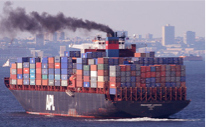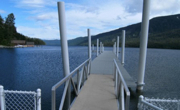 Publisher's note: the following is our position summary available at the current United Nations climate meeting in Marrakech, prepared by Charlene Caprio. Since the UN climate meeting in 1997 in Kyoto, the International Maritime Organization (IMO) eagerly took on the responsibility to reduce shipping’s GHG emissions. The Paris Agreement further kept the IMO in control of maritime GHG emissions, rather than incorporating them into state obligations. Now, we see a continual let down by the IMO going into the UNFCCC COP22 discussions in Marrakech, Morocco. To summarize its strategy, the IMO has created a 3-step approach with a vague timeline that starts with a data collection system and then bounces monitoring and reporting responsibilities to mostly “Flags of Convenience” States and the production of an anonymized database that may lead to more reports and meetings and possibly some action some time in the future, maybe. No significant CO2 reduction strategies, obligations, penalties or support for clean energy technologies in the global maritime industry have been created. How does this work? Let’s analyze key parts of the IMO’s briefing paper from the Marine Environment Protection Committee’s 70th Session in October that the IMO is armed with at COP22, “New requirements for international shipping as UN body continues to address greenhouse gas emissions” i:
This statement means that there has been no reporting from ships regarding the myriad of fossil fuels they consume. The industry has been polluting without transparency, accountability or scientific analysis.
The IMO’s new reporting requirements are only a first step in a new 3-step approach that is to include future discussions. How much longer can we allow the IMO to proceed with such a vague process that still punts into the future action that may be taken to address climate change someday? The shipping industry needs to clean up its CO2 emissions now. The IMO’s own Third IMO Greenhouse Gas Study 2014 report stated that by 2050, CO2 emissions from international shipping could grow by between 50 percent and 250 percent, depending on future economic growth and energy developments. ii Global consumption practices, if unaltered, will also continue to demand even more ships in the water. A vessel built today is likely to be traversing our seas for 20-30 years. By dragging its feet, the IMO is setting a dangerous long-term trajectory for CO2 emissions and deadly pollution. iii
To read this section, it is important to know what is a flag State. The industry allows ship owners to register vessels in states offering the least amount of resistance or enforcement burdens. These states are known as “Flags of Convenience” (FOC) states and are notoriously known for disregarding environmental and labor laws and regulations. FOC problems are heavily written about; just Google the issue. The IMO is mandating that FOC states now assume the role of reporting fossil fuel emissions for ships. What can we expect of a FOC State, like Liberia, to do? How will FOC States even fund this huge responsibility? Most important, who holds the power, the ship owners who can de-register in a FOC State and jump to another one, or the FOC state that is dependent upon revenues from ship registrations? How is this system of FOC supervision better than bringing shipping emissions directly into the Paris Agreement and state obligations?
This means even more reports before any action will happen. Also, why should the data be anonymized? Shouldn’t dirty polluters be disclosed to the public? Why is the industry protecting companies who pollute our seas and air and also cause deaths? iv
Where is the breakthrough and tangible progress? We can’t find it in the IMO’s strategy. However, what we do find is an IMO self-praising strategy to maintain control, while refusing to act responsibly, over the harmful and deadly pollution that keeps spewing out of a global shipping industry. _______________________
i The IMO’s full briefing, “New requirements for international shipping as UN body continues to address greenhouse gas emissions,” (28 28/10/2016) is available here: http://www.imo.org/en/MediaCentre/PressBriefings/Pages/28-MEPC-data-coll... -- Sail Transport Network and SAIL MED (contact: charlene "at" sailtransportnetwork.org)   |
|||
 |
||
|
|
